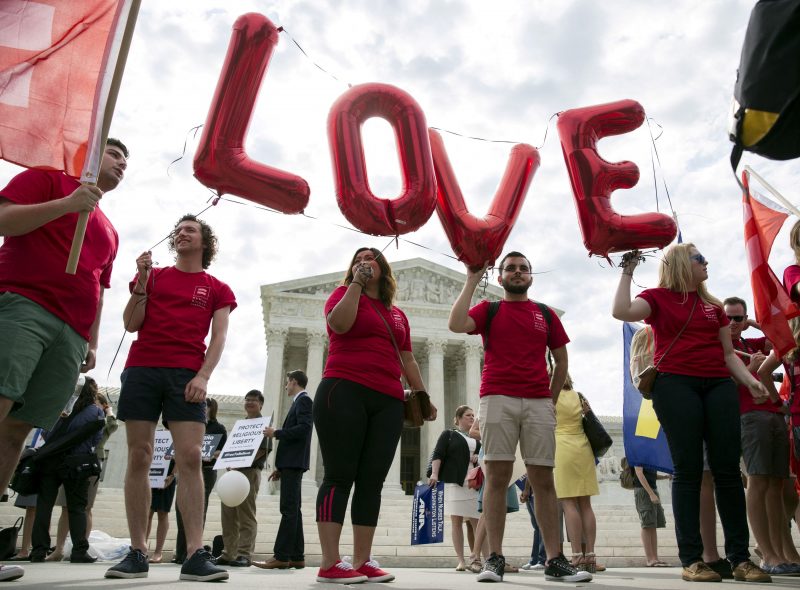
House to vote on landmark legislation to protect same-sex, interracial marriages
The House is poised to vote Thursday on landmark legislation that would enshrine marriage equality in federal law, granting protections to same-sex and interracial couples and clearing the way for President Biden’s signature.
The House passed an earlier version of the Respect for Marriage Act in July, but the Senate delayed its vote on the bill until after the midterm elections. Late last month, the Senate passed the bill with a bipartisan amendment to allay some Republicans’ concerns about religious liberty. The amended bill passed the Senate in a 61-36 vote, with 12 Republican senators joining Democrats in favor of it.
The House must now vote on the bill with the amendment, which clarifies that the federal government would not be authorized to recognize polygamous marriages and confirms that nonprofit religious organizations would not be required to provide “any services, facilities, or goods for the solemnization or celebration of a marriage.”
The amended bill is expected to have enough support to pass the House. After it does, it would then head to Biden’s desk to be signed into law. Biden has said that ensuring federal protections for marriage equality is among his legislative priorities in the lame-duck session.
“The United States is on the brink of reaffirming a fundamental truth: love is love, and Americans should have the right to marry the person they love,” Biden said in a statement after the bill passed the Senate. “For millions of Americans, this legislation will safeguard the rights and protections to which LGBTQI+ and interracial couples and their children are entitled.”
The vote underscores a nearly three-decade evolution, from 1996 when President Bill Clinton signed legislation that defined marriage as a union between a man and a woman, to the 2004 election when President George W. Bush used the issue to energize GOP voters, to the Supreme Court’s 2015 decision legalizing same-sex marriage.
Same-sex marriage bill
1/2
End of carousel
The Respect for Marriage Act would not force states to issue marriage licenses to same-sex couples but would require that people be considered married in any state as long as the marriage was valid in the state where it was performed.
The bill also would repeal the 1996 Defense of Marriage Act. In addition to defining marriage as the union of one man and one woman, it allowed states to decline to recognize same-sex marriages performed in other states. That law has remained on the books despite being declared unconstitutional by the Supreme Court’s 2013 ruling in United States v. Windsor and its 2015 ruling in Obergefell v. Hodges, which guaranteed same-sex couples the fundamental right to marry.
In a guest op-ed for The Washington Post, House Speaker Nancy Pelosi (D-Calif.) recalled how, in her first speech on the House floor in 1987, she declared that “we must take leadership of course in the crisis of AIDS.”
“Just as I began my career fighting for LGBTQ communities, I am overjoyed that one of the final bills I will sign as speaker will be the Respect for Marriage Act: ensuring the federal government will never again stand in the way of marrying the person you love,” Pelosi wrote.
Democrats have warned since June that federal protections for same-sex and interracial marriages, as well as other rights, could be at risk after the Supreme Court overturned Roe v. Wade, which for nearly 50 years had guaranteed the right to an abortion in the United States.
In his June concurrence with the decision to overturn Roe, Supreme Court Justice Clarence Thomas wrote that the high court should also examine previous rulings that legalized the right to buy and use contraception without government restriction (Griswold v. Connecticut), same-sex relationships (Lawrence v. Texas) and marriage equality (Obergefell v. Hodges).
“In future cases, we should reconsider all of this Court’s substantive due process precedents, including Griswold, Lawrence, and Obergefell,” Thomas wrote. “Because any substantive due process decision is ‘demonstrably erroneous’ … we have a duty to ‘correct the error’ established in those precedents.”
Thomas’s opinion set off alarm bells among proponents of marriage equality, who pointed out that if the Supreme Court were to overturn Obergefell, as it did Roe, then the right to same-sex marriage would similarly fall to the states. Currently, 35 states have statutes or constitutional amendments banning same-sex marriage that would take effect if Obergefell were overturned, according to the Movement Advancement Project, a nonprofit that advocates for LGBTQ equality.
